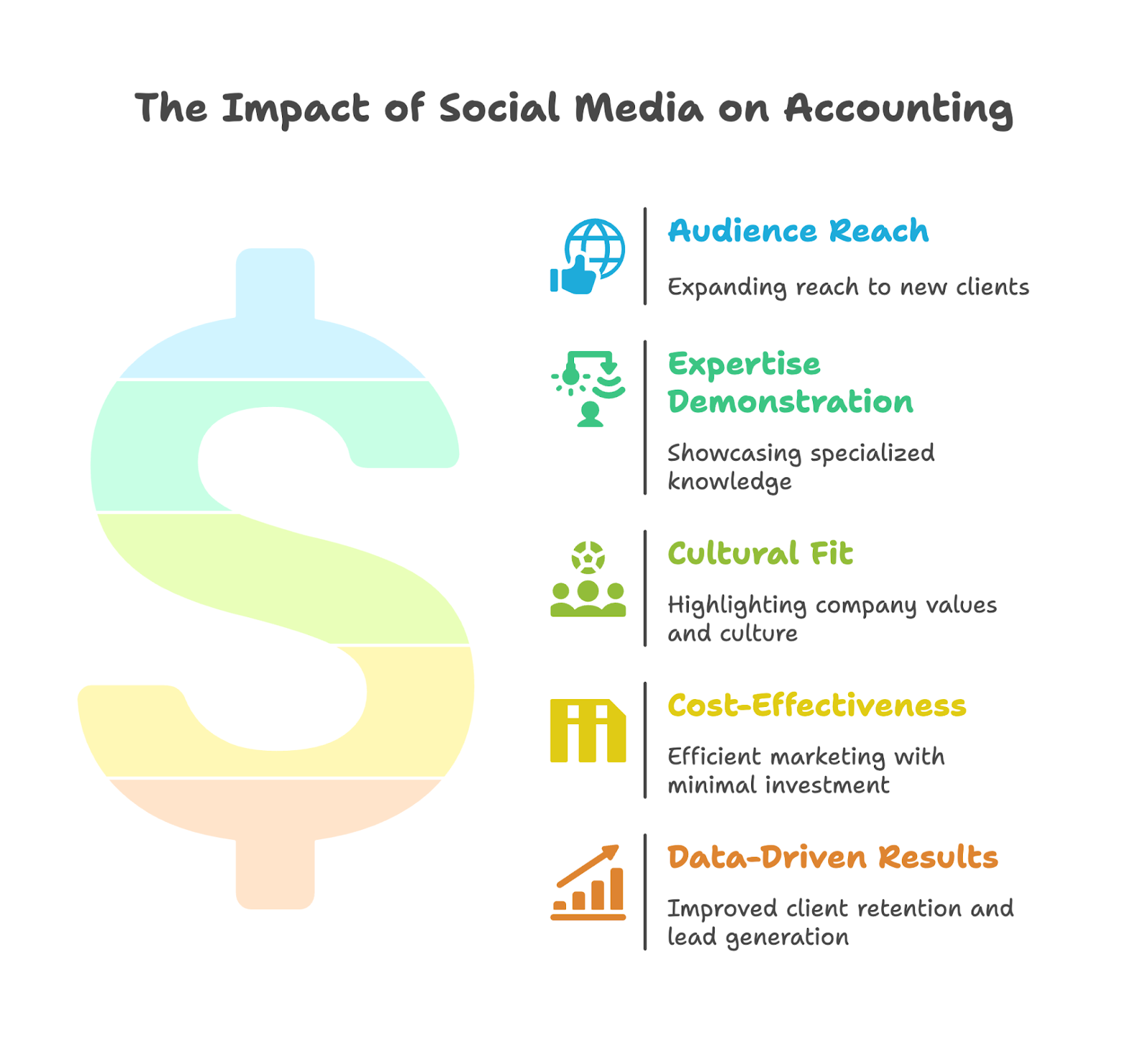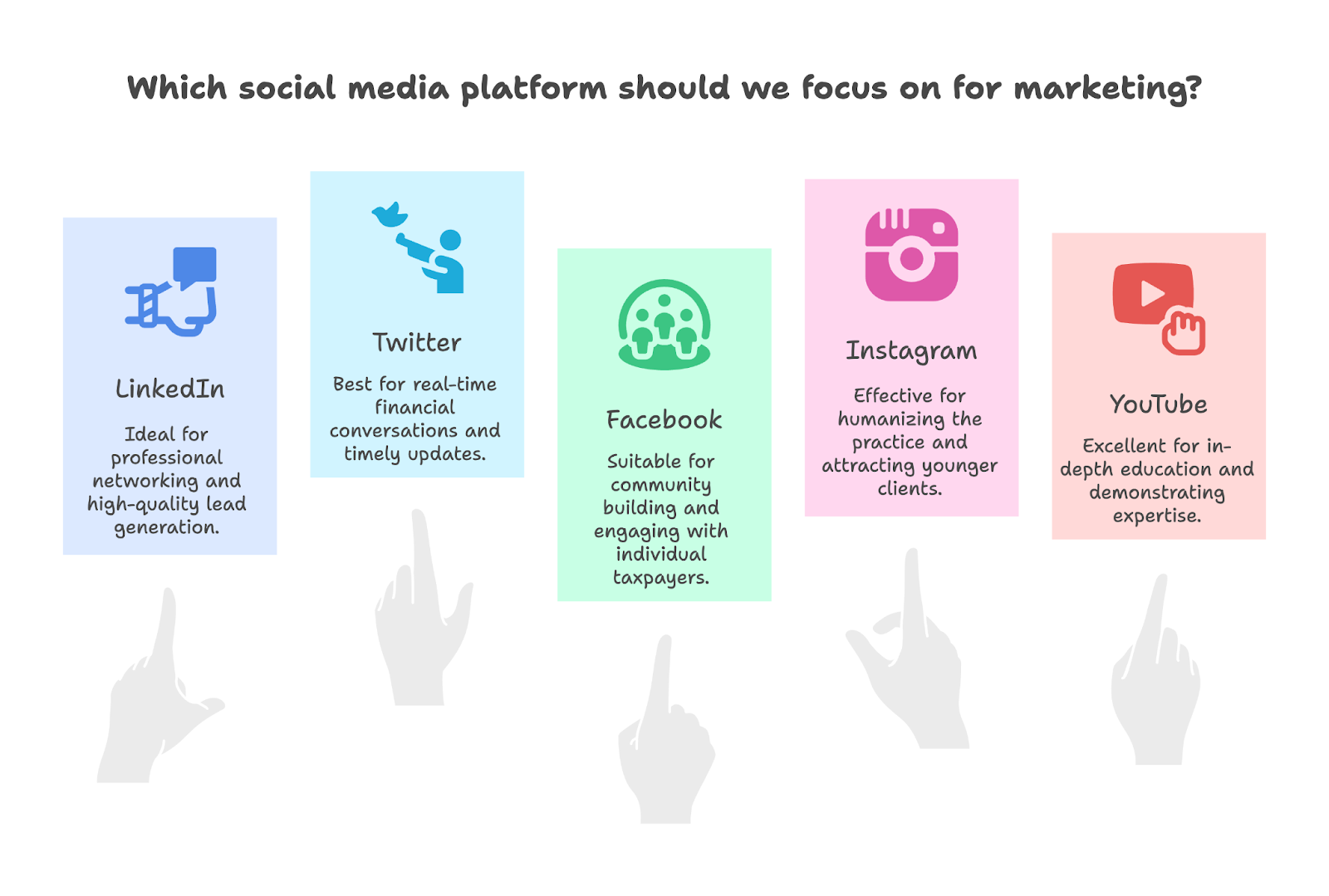In today's digital-first environment, social media for accountants has evolved from optional to essential. The accounting industry has witnessed a significant shift in how potential clients discover and choose their financial partners. Gone are the days when accounting firms could rely solely on referrals and traditional marketing methods.
For many accountants, navigating social media marketing can feel overwhelming. However, effective social media for accountants doesn't require becoming a marketing expert overnight, it simply demands understanding how to translate professional knowledge into engaging content that resonates with your target audience.
What makes social media particularly powerful for accountants is its ability to humanize a profession often perceived as rigid. Through strategic content creation, an accountant can showcase not just technical knowledge but also approachability, trustworthiness, and unique perspective. This combination drives new client acquisition and retention in the digital age.
This guide explores proven social media for accountants strategies, offering concrete ideas for accountants looking to establish or improve their digital presence. Whether you're a solo practitioner or part of a larger accounting firm, these insights will help you connect meaningfully with ideal clients.
Social media for accountants has become indispensable for practice growth. With billions of active users across platforms, social media posts allow accountants to reach previously inaccessible audiences. Business owners and individuals seeking financial guidance are actively present on these platforms, creating rich opportunities to demonstrate expertise.
Social media enables accountants to build authority in specialized niches. Whether focusing on cryptocurrency taxation, nonprofit accounting, or small business advisory services, platforms like LinkedIn, Twitter, and Instagram allow showcasing specialized knowledge through targeted social media post ideas addressing specific client pain points.
For an accounting firm seeking differentiation, social media provides platforms to showcase company culture, team personalities, and values, critical factors in client decision-making. Potential clients choose accountants based not just on technical capabilities but on perceived cultural fit and shared values.
Another compelling reason for accountants and CPAs to embrace social media is cost-effectiveness compared to traditional marketing channels. With minimal financial investment, well-executed social media strategies can generate significant visibility and lead generation results, particularly valuable for solo practitioners and smaller firms with limited marketing budgets.
The data supports this shift toward digital marketing. Firms effectively leveraging social media marketing report higher client retention rates, increased referrals, and more efficient lead generation compared to those relying solely on traditional methods.

Not all platforms are equal for social media for accountants. Understanding where potential clients spend time online is crucial for maximizing marketing efforts.
LinkedIn stands as the champion for accountant marketing. As a professional network, LinkedIn offers direct access to business decision-makers. For generating high-quality leads, no platform matches LinkedIn's effectiveness in the accounting space.
Maximize LinkedIn's potential by:
Twitter provides unique opportunities for accountants to join real-time conversations about finance, tax updates, and business news. The platform's fast-paced nature makes it ideal for sharing timely updates and demonstrating responsiveness to industry developments.
Despite being personally oriented, Facebook remains valuable for social media for accountants, particularly firms serving individual taxpayers or small business owners. Facebook Groups have become powerful for building communities around specific financial concerns.
Instagram offers unique opportunities to humanize your practice and break stereotypes. For firms attracting younger clients or showcasing workplace culture, Instagram provides excellent visual storytelling platforms.
For accountants comfortable on camera, YouTube offers unparalleled opportunities to demonstrate expertise through content marketing. Video content explaining complex financial concepts significantly enhances firm visibility and authority.
The most successful accounting firm social media strategies focus on mastering 1-2 platforms rather than maintaining diluted presence across all networks.

Creating valuable social media content requires strategic approaches that transform complex financial information into engaging, accessible content while maintaining professional credibility.
One of the most valuable services accountants provide on social media is education. Your professional knowledge allows breaking down complex financial concepts into digestible information helping audiences make better decisions.
Effective educational content ideas include:
To stand out as an influencer in the accounting space, move beyond basic information and offer unique perspectives on industry trends, challenges, and opportunities. Thought leadership demonstrates strategic thinking and positions you as more than just a technical expert.
Practical tips provide immediate value through actionable advice. This content tends to receive high engagement because it offers clear utility to your audience.
Effective formats include:
Adding human elements to your social media presence helps build trust and connection. People hire accountants they like and trust, and personal content helps forge emotional connections.
The accounting profession naturally follows cyclical patterns, providing perfect opportunities for timely content addressing seasonal concerns. Being first to provide guidance on emerging issues positions you as proactive rather than reactive.
Understanding how to craft compelling social media posts that capture attention in crowded feeds is essential for maximizing digital impact. The power of social media visuals cannot be overstated.
In fast-moving feeds, visual elements provide critical stopping power. Even for technical topics, compelling visuals significantly increase engagement rates.
Once visuals capture attention, headlines determine whether someone continues reading. For accountants should use social media effectively, mastering compelling headlines is essential.
Every post should include clear calls to action (CTA) guiding followers toward meaningful engagement. These CTAs help you build your brand and develop deeper relationships.
LinkedIn deserves special attention from accounting professionals. As the premier business networking platform, it offers unparalleled opportunities to connect with decision-makers, demonstrate expertise, and generate high-quality leads.
Your LinkedIn profile serves as your digital first impression. Strategic optimization significantly increases visibility in searches and through recommendation algorithms.
LinkedIn's algorithm rewards content generating meaningful engagement. For accountants and CPAs, create posts prompting networks to comment, share, and interact.
Beyond content publishing, LinkedIn excels as a relationship-building platform. Strategic connection and engagement practices significantly expand professional networks and referral opportunities.
Developing effective social media strategy requires systematic approaches to planning, execution, and measurement. For accounting firms, implementing sustainable social media programs requires addressing several key components.
Clearly define what success looks like for social media efforts. Different firms may have entirely different objectives based on growth priorities and target clients.
Social media success requires consistent attention and adequate resources. Whether handled internally or through partnerships with specialists, clearly defined responsibilities are essential.
Consistency is critical for social media success. Structured content calendars ensure regular posting while aligning with seasonal priorities in the accounting industry.
For accounting professionals, regulatory compliance and reputation management must remain top priorities in social media activities. Best practices for risk management include establishing clear policies and approval processes.
For data-driven accounting professionals, effective measurement of social media performance is essential to justify continued investment and optimize results. Understanding which metrics matter empowers informed decisions about social media for accountants strategy.
Key Performance Indicators should directly connect to business objectives rather than focusing solely on vanity metrics. Different goals require different measurement approaches.
Each platform offers native analytics tools providing valuable insights into content performance and audience behavior. Regular review helps identify optimization opportunities.
For accounting professionals, demonstrating return on investment is particularly important. Several calculation approaches help quantify business value of social media investments.
The landscape of accounting firm marketing has transformed dramatically, with social media for accountants evolving from novel idea to essential business development channel. Successful social media posts require more than technical accuracy, they demand creativity, consistency, and strategic alignment with business goals.
The journey to social media success isn't about pursuing viral moments but building meaningful connections with ideal clients, demonstrating unique value propositions, and establishing yourself as a trusted resource. This relationship-building approach aligns perfectly with the trust-based nature of the accounting profession.
For firms beginning their social media journey, sustainable growth comes from consistent effort rather than sporadic campaigns. Start focused on one or two platforms where ideal clients are most active, gradually expanding as you build confidence and capacity.
The power of social media for accounting professionals lies not in reach but in ability to humanize a profession often perceived as transactional, building personal connections that ultimately drive client decisions and loyalty. The same qualities making you an exceptional accountant, attention to detail, proactive communication, thoughtful analysis, and client-centered thinking, will serve you equally well in building effective social media presence.
By approaching social media with strategic intention, consistent execution, and genuine desire to provide value, you'll build digital presence that not only attracts new clients but strengthens relationships with existing ones, creating sustainable competitive advantage in an increasingly digital marketplace.
LinkedIn is the most effective platform for accountants, especially those serving business clients. It offers direct access to decision-makers and provides the best ROI for professional services. Start with LinkedIn to build your foundation, then expand to other platforms as resources allow.
Consistency matters more than frequency. Aim for 2-3 quality posts per week on LinkedIn, daily engagement on Twitter if you're active there, and 1-2 posts weekly on other platforms. Focus on maintaining regular posting schedules rather than overwhelming your audience with daily content.
Educational content that simplifies complex financial concepts performs exceptionally well. This includes tax tips, regulatory updates, financial planning advice, and answers to common client questions. Behind-the-scenes content showcasing your team and thought leadership pieces also generate strong engagement.
Track metrics aligned with your business goals: website traffic from social platforms, lead generation, engagement rates, and ultimately client acquisition. Use UTM parameters to track social media traffic in Google Analytics and monitor platform-specific analytics for engagement insights.
Maintain client confidentiality, avoid giving specific financial advice without proper disclaimers, establish content approval processes for technical topics, and create clear social media policies for your firm. Always ensure your social media presence enhances rather than risks your professional reputation.
Small firms have advantages in authenticity and personal connection. Focus on showcasing your unique personality, specialized expertise, and personal client relationships. Engage directly with your community, share local insights, and leverage the fact that clients can work directly with the firm owner, something larger firms can't offer.
Your expertise deserves better support. Madras Accountancy partners with forward-thinking CPA firms and fractional CFOs to deliver world-class accounting services through our experienced offshore teams. We handle the heavy lifting while you focus on strategic advisory work that drives real value for your clients. Ready to experience the power of true partnership? Let's explore how we can amplify your success.

A practical comparison of hiring a freelancer vs using a dedicated offshore accounting team, focusing on continuity, quality control, security, and scaling.

How CPA firms outsource payroll and 1099 work to reduce penalties and admin load, with a clean workflow for approvals, filings, and year-end reporting.

Practical do's and don'ts for CPA firms outsourcing accounting work, based on common failure points and what successful rollouts do differently.